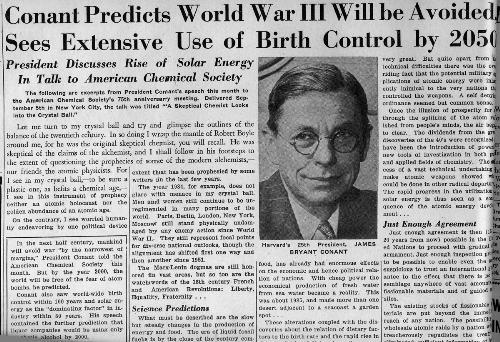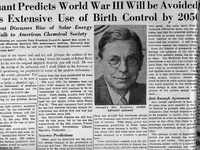
A respected chemis who personally worked on the Manhattan Project, James Bryant Conant '
On Oct. 15, 1951, the Massachusetts state legislature passed a bill making university presidents responsible for preventing communist and subversive activities from taking place on campus.
The new law launched an offensive on the principles of academic freedom long cherished by students and faculty and illuminated a long-time dilemma at Harvard—what was the University’s proper role in the all-encompassing fight against communism?
The looming threat of Stalin’s Soviet Union overshadowed campus life during the Class of 1952’s senior year, as the merits of academic freedom became an almost daily subject of debate and prominent professors faced allegations of treachery.
Leading the University was eminent chemist and erudite political commentator James Bryant Conant ’14, who in the last year of his presidency sought to pilot Harvard through this period of turbulence.
“Drastic shifts in the national scene,” he wrote in his final presidential report at the end of the academic year, “have influenced immediately and profoundly the work of all our major institutions.”
Multimedia
The dangers of the nuclear age were a constant preoccupation during the year, as Harvard faculty and students worried along with the rest of the country about the dangers of mutually assured destruction.
Seeking to underscore the dangers posed by the Soviet Union, Conant brought the prospect of a nuclear holocaust closer to home.
“The prospect of the physical annihilation of all of Harvard is for the first time in all our history a possibility we must admit,” he wrote.
As it had provided technological expertise in the Second World War just a decade previously, Harvard now offered its country ideological support for the battle against communism.
So much was even noted in Moscow. The Russian humor magazine Krokodil lambasted Harvard in its Sept. 30 edition for being under the thumb of the U.S. military. It even ran a cartoon on its back page entitled “Mathematics,” which showed a drill sergeant shouting “one, two, one, two” at a group of Harvard students carrying rifles.
‘Period of Trial’
Although Soviet critics viewed Harvard as a bastion of right-wing militarism, many in America worried about its spiritual collapse under a socialist threat.
The editor of a reactionary monthly magazine, The Cross and the Flag, accused the president of the Harvard Liberal Union, Walter C. Carrington ’52, of being a “creeping socialist” and demanded that he be expelled.
Meanwhile a string of Harvard professors found themselves charged as communists and fierce debate raged in Cambridge—as it did nationwide—on the boundary between protecting academic freedom and preventing treason.
Conant sided clearly in favor of openness and academic freedom, which he said constituted “the essence of a university.” Nonetheless he acknowledged that America found itself undergoing “a long period of trial for the university tradition which started when Hitler came to power in Germany.”
Read more in News
Sikh’s Sword Seized By School













